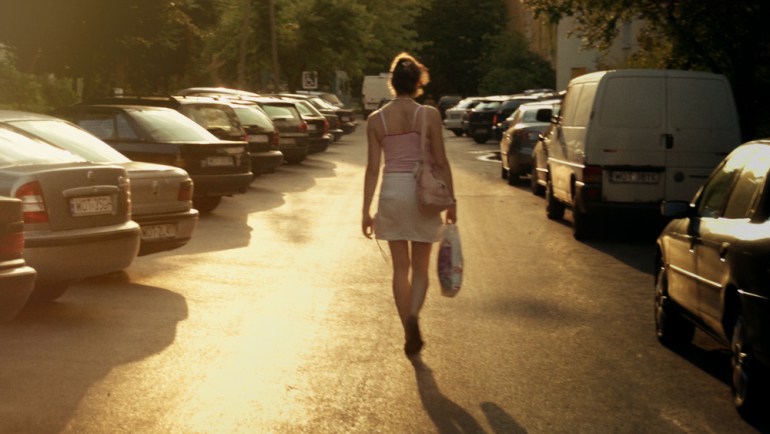Her mother still calls her 'Wojtek', her ex-wife avoids encounters, and her children have completely distanced themselves from her. They are ashamed. Marianna understands their reactions, fears and grudges. But there is no one who understands her.
 Still from the film Call Me Marianna, dir. Karolina Bielawska, photo: KFF promotional materials
Still from the film Call Me Marianna, dir. Karolina Bielawska, photo: KFF promotional materialsBefore she officially became Marianna, she had lived as a man for many years. She had a family, children, and a job at the Warsaw Metro. And she had a constant sense of self-disgust – a female mind trapped in Wojtek’s male body. Not until the age of 43 did Marianna realize that she could no longer live as a man. She moved out and filed for divorce. She stayed at her parents’ until they wanted to send her to a psychiatric hospital. For a while she slept in the car in order to save money for a sex change operation.
Karolina Bielawska loyally accompanies Marianna in her fight for the right to be herself. The director follows her every step, becoming an important participant in her life. ‘This film (...) is not based on my observations, but on the relationship that has developed between us. To some extent, her life became a part of my life. This is her struggle for acceptance, love and dignity, in which I have participated’, said the director to Wysokie Obcasy magazine.
The closeness between the author of the film and its protagonist turned out to be the key to success. Call Me Marianna is a motion picture imbued with warmth and empathy. The director follows the emotions of the character, but does not allow herself any sentimentality. Her camera looks closely at the protagonist, listens to her conversations and reveals her daily dealings with life and people. The cinematographer, Kacper Czubak, filmed Marianna in a manner that shows her loneliness and captures the emptiness that surrounds her.
Yet, Karolina Bielawska’s film is primarily a story about loneliness. Not about transsexualism, nor sex changes, but about exclusion. By taking up the fight for her life and her identity, Marianna dooms herself to rejection. Family members are unwilling to accept the fact that their husband and father has begun to look and act like a woman. Her daughter will not invite Marianna to her wedding, her ex-wife is reluctant to answer the phone. And Marianna’s mother begs her to behave like a normal son.
Rejected by those close to her, Marianna also feels abandoned by the God in whom she strongly believes – especially, at the moment when she was back on an even keel before fate struck again. Only a few reach out to her. Among them is Andrzej, a man met in a sanatorium, who falls in love with her and becomes one of the most beautiful characters in the film.
 Still from the film Call Me Marianna, dir. Karolina Bielawska, photo: KFF promotional materials
Still from the film Call Me Marianna, dir. Karolina Bielawska, photo: KFF promotional materialsBielawska shows Marianna’s path to a new life, while reconstructing events from her past. She uses old recordings from the family archive and listens to Marianna’s memories. However, instead of the traditional ‘talking heads’ interview footage, Bielawska’s film features pre-arranged scenes, such as two actors (Mariusz Bonaszewski and Jowita Budnik) sitting at a small table on a theatre stage reading passages from the play by Bielawska and based on Marianna’s story. Once again, she can relive the most difficult moments of her life. Bonaszewski plays the role of Wojtek – Marianna’s former male identity, and Budnik – the role of the wife. Marianna listens to their lines, explains the motivations, and cries at times. Now and then, the actors also give up the performance, for they are overwhelmed by emotions and the painful story they're taking part in.
Call Me Marianna is a film full of tenderness, very intimate and beautiful. It brings tears to the eyes, but not for a moment does it force them. Marianna’s subtly narrated drama is a lesson in empathy and tolerance.
- Mów mi Marianna/ Call Me Marianna, dir. Karolina Bielawska, cinematography: Kacper Czubak, editor: Daniel Gąsiorowski, music: Antony and The Johnsons, Natalia Fiedorczuk.
Author: Bartosz Staszczyszyn, 07.06.2015, transl. GS, June 2015